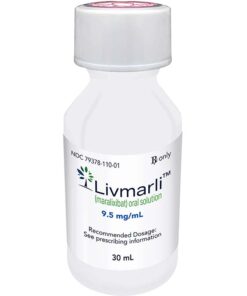Buy Ocaliva (obeticholic acid) Online For Sale
From $2,410.00
DISEASE INDICATIONS: Primary Biliary Cholangitis (PBC)
MANUFACTURER: Intercept Pharma Ltd
USAGE: Oral
MEDICINE APPROVED BY:
European Medical Agency (EMA)
Food and Drug Administration (FDA)
Health Canada
Therapeutic Goods Administration (TGA)
Ocaliva is used primarily for treating PBC by binding to the nuclear receptor FXR, modulating liver function and reducing PBC symptoms.
Ocaliva (obeticholic acid) is a medication that is primarily used for the treatment of a rare liver disease known as primary biliary cholangitis (PBC). This medication functions by binding to the nuclear receptor FXR in the liver and modulating the expression of genes involved in liver function. In doing so, it helps to reduce the symptoms associated with PBC, such as fatigue, itching, and abdominal pain.
PBC is a chronic, autoimmune liver disease that primarily affects middle-aged women. The condition typically progresses slowly, with inflammation and damage gradually occurring to the tiny bile ducts that help to transport bile out of the liver. Over time, this can lead to cirrhosis and liver failure.
Prior to the development of Ocaliva, the standard treatment for PBC was ursodeoxycholic acid (UDCA), a medication that has been used for several decades. While UDCA can be effective in reducing liver inflammation, it is not always successful at slowing the progression of the disease or preventing liver damage.
Ocaliva was approved by the FDA in May 2016 for the treatment of PBC. Clinical trials involving the drug have shown promising results, particularly in terms of its ability to improve liver function and reduce symptoms. One study found that patients who took Ocaliva along with UDCA experienced a greater reduction in liver enzyme levels compared to those who took only UDCA.
However, there are some potential risks associated with taking Ocaliva. The most common side effect is itching, which can become severe in some cases. Other potential side effects include fatigue, abdominal pain, and elevated levels of cholesterol. Patients taking Ocaliva may also be at increased risk for liver injury and should be carefully monitored by their healthcare provider.
It is important to note that Ocaliva is not a cure for PBC and should be used as part of a comprehensive treatment plan. This plan may also include lifestyle changes, such as avoiding alcohol and maintaining a healthy diet, as well as other medications to manage symptoms or prevent complications.
In conclusion, Ocaliva is a medication that has shown promise in the treatment of a rare liver disease called primary biliary cholangitis. While it is not without risks, it has demonstrated effectiveness in improving liver function and reducing symptoms. As with any medication, patients should discuss the potential benefits and risks of Ocaliva with their healthcare provider and follow all recommended guidelines for use.
| Package | 30 tablets of 5 mg, 30 tablets of 10 mg, 100 tablets of 5 mg, 100 tablets of 10 mg |
|---|
Be the first to review “Buy Ocaliva (obeticholic acid) Online For Sale” Cancel reply
Related products
Hepatology






Reviews
There are no reviews yet.